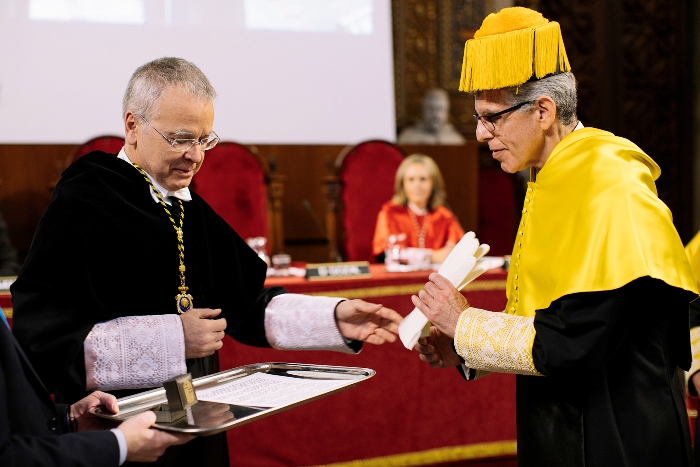David Gozal, awarded honorary doctorate by the UB: “Sleep is one of the most unprotected and unappreciated vlife-sustaining functions”

“I hope that by now, I have piqued your curiosity about the most unprotected or unappreciated life-sustaining function of modern times: sleep”, said David Gozal, addressing the audience, in his speech as doctor honoris causa at the University of Barcelona. The ceremony took place on Wednesday, March 27, in the Paranimph of the Historical Building, and was presided by the rector, Joan Elias. David Gozal, professor at the University of Missouri, was accompanied by Professor Ramon Farré, from the Faculty of Medicine and Health Sciences of the UB, acting as sponsor, and the dean of the same Faculty, Francesc Cardellach.

“I hope that by now, I have piqued your curiosity about the most unprotected or unappreciated life-sustaining function of modern times: sleep”, said David Gozal, addressing the audience, in his speech as doctor honoris causa at the University of Barcelona. The ceremony took place on Wednesday, March 27, in the Paranimph of the Historical Building, and was presided by the rector, Joan Elias. David Gozal, professor at the University of Missouri, was accompanied by Professor Ramon Farré, from the Faculty of Medicine and Health Sciences of the UB, acting as sponsor, and the dean of the same Faculty, Francesc Cardellach.
Professor Gozal started his speech stating that sleep is omnipresent in most species and that it has evolved over millions of years. “Even worms, arthropods and flies show sufficient degrees of sleep physiology and behavior patterns”. Other species, such as migrating birds or some cetaceans, have developed systems that enable them to sleep using half the brain, “reflecting unique revolutionary adaptations related to the need to preserve oxygen while underwater or maintain flock flying activity”, he said. Regarding humans, expert anthropologists note that insomnia, for example, is a “protection mechanism” and “evolutionary indicator” from many years ago, when its function was to avoid predators.
Gozal also explained how his vocation to study sleep resulted from a personal experience in a hospital when a baby died of a Sudden Infant Death Syndrome. “At that time I did not know anything about sleep. The medical curriculum did not include any lectures on sleep at the time, nor does it include many nowadays!”, he highlighted. Regarding training, Gozal noted how his work together with Professor Farré of the UB led them to “establish the pathway to train the new hybrid and highly skilled professionals called sleep bioengineers”.
In his conclusions, Gozal defined sleep as “one of the fundamental pillars of our life, a column sustaining our wellness, a life-sustaining function that cannot be treated as a tradeable commodity, but rather needs to be respected and preserved”. Like other biological systems, “sleep is a highly complex system, hierarchically organized”. To separate the elements, he said now is the ideal time, mainly due the important advances on artificial intelligence, and because we could use “the sophisticated biological techniques to apply similar engineering methods and unveil the hidden mysteries of sleep and its functions”, he noted.
“I firmly believe in doing so, that we stand to gain an understanding not only for the evolutionary past that led to the emergence of sleep as a constant property of life in the universe, but also of our present. And if we do this, we can decipher and eradicate diseases that are related to sleep, which will bring an improvement of our future”, the expert concluded.
Mastership and leadership in sleep medicine
In his laudatio, Ramon Farré went over the main milestones of David Gozalʼs scientific projects, which made him the leading expert in sleep apnea in 2019, according to Expertscape. Farré noted that many articles by Gozal “are changing the conceptual frame of our understanding of sleep apnea treatment”. Fundamental advances for the children diagnosis with this disorder with proteomic and biocomputing techniques “are finding their pathway to the clinical practice, and allow many previously undiagnosed infants access the treatment”, said the UB professor.
According to Farré, the intense research collaboration between Professor Gozalʼs laboratory and the University of Barcelona focused on the study of the relation between sleep apnea and cancer, and in particular, analyzed the mechanisms with which intermittent hypoxia promotes tumor growth and metastasis.
Over the course of his speech, Farré highlighted Gozalʼs mastership and professional mentoring, both in high level institutions and environments of precarious social and economic means, where he carried out an important volunteering task. Regarding the social side, Professor Farré mentioned the creation of health networks such the one in Cameroon, which reduced infant mortality by a third part, and which is still operating. His career shows “the excellence” of David Gozal “in different aspects of medicine: doctor, educator, healthcare planner, and scientific researcher”, concluded the UB professor.
The extraordinary awards for the 2016/2017 bachelor degrees were given during the ceremony.
